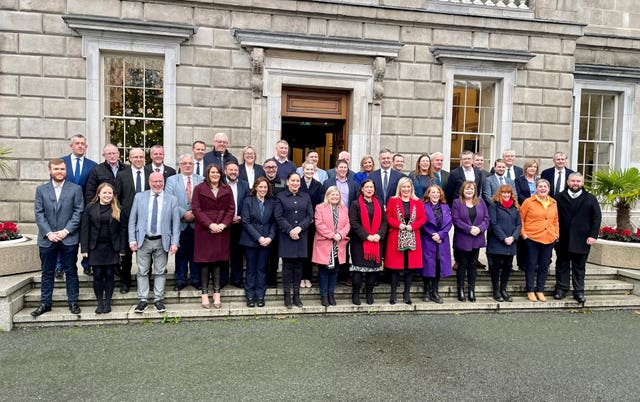
Sinn Fein leaders have insisted their party’s performance in Ireland’s General Election is not a setback for the campaign for Irish reunification.
Party leader Mary Lou McDonald had vowed to deliver a step change in the drive for constitutional change if Sinn Fein entered government and she became taoiseach.
The odds of either of those scenarios coming to pass following Friday election now look extremely slim, with Fianna Fail and Fine Gael expected to re-enter another coalition government in Dublin, leaving Sinn Fein facing another five years as the Dail’s main opposition party.
Fianna Fail won 48 seats in the election, with Sinn Fein taking 39 and Fine Gael securing 38.

Fianna Fail also took the most first preference votes in the proportional representation election, securing 21.9% to Fine Gael’s 20.8%.
Sinn Fein came in third on 19%.
While Sinn Fein’s vote share represented a marked improvement on its disappointing showing in June’s local elections in Ireland, it is still significantly down on the 24.5% poll-topping share it secured in the 2020 general election.
Ms McDonald and vice-president Michelle O’Neill, who is Northern Ireland’s First Minister, met Sinn Fein’s new-look team of TDs at Leinster House on Wednesday.
Afterwards, they were both asked by reporters if the election result was a setback for their Irish unity project.
“No, far from it,” replied Ms McDonald.
“As a matter of fact, it was interesting during the election campaign the number of parties that set out actually very ambitious targets and ideas around reunification, the democratic conversation. So, far from it. I think it’s still very much game on.”
Ms O’Neill added: “Absolutely, we just now returned with 39 TDs, the largest ever team of Sinn Fein in the Dail.
“I think that speaks volumes in terms of our project and what we want to achieve.”


Why are you making commenting on The National only available to subscribers?
We know there are thousands of National readers who want to debate, argue and go back and forth in the comments section of our stories. We’ve got the most informed readers in Scotland, asking each other the big questions about the future of our country.
Unfortunately, though, these important debates are being spoiled by a vocal minority of trolls who aren’t really interested in the issues, try to derail the conversations, register under fake names, and post vile abuse.
So that’s why we’ve decided to make the ability to comment only available to our paying subscribers. That way, all the trolls who post abuse on our website will have to pay if they want to join the debate – and risk a permanent ban from the account that they subscribe with.
The conversation will go back to what it should be about – people who care passionately about the issues, but disagree constructively on what we should do about them. Let’s get that debate started!
Callum Baird, Editor of The National
Comments: Our rules
We want our comments to be a lively and valuable part of our community - a place where readers can debate and engage with the most important local issues. The ability to comment on our stories is a privilege, not a right, however, and that privilege may be withdrawn if it is abused or misused.
Please report any comments that break our rules.
Read the rules hereLast Updated:
Report this comment Cancel